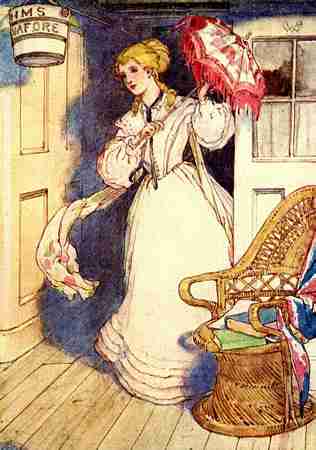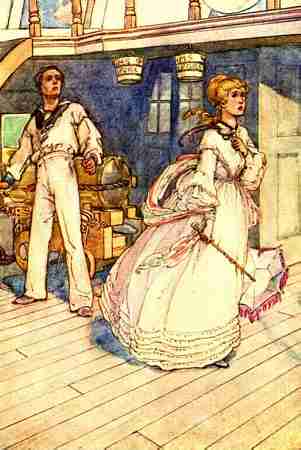The Story of H.M.S. Pinafore
by Sir W. S. Gilbert
Go to a PDF version of this chapter.
'THE ward-room lunch was finished, and all the ladies were playing "Bridge" for nuts with the officers, except Josephine, whose thoughts were too much occupied with other and more important matters. So she came on deck to indulge in a rêverie all alone.
"It is useless," said she to herself; "Sir Joseph's attentions disgust me. I know that he is a truly great and good man, for he told me so himself, and of course he would know;[1] but to me he seems tedious, fretful, and dictatorial. Yet his must be a mind of no common order, or he would not dare to teach my dear Father to dance a hornpipe on the cabin table."
It was Sir Joseph's firm belief that if Great Britain were to retain her proud position as the most powerful naval country in the world, it was essential that all her sailors should learn to dance hornpipes. It was all he knew about the Navy, and he had been three years learning that.
As Josephine soliloquized, she saw Ralph Rackstraw advancing towards her with an undulating swan-like motion that teemed with unspeakable grace.
"Ralph Rackstraw!" she exclaimed, withdrawing from her pocket the false nose which she always put on when she thought she was going to be too much admired.
"Nay, lady," said he, "put away yon pasteboard mockery. The matchless beauty of the real one is so deeply graven in my memory that I can see it even through that hollow absurdity."
"In that case," said she, "it is of course useless to wear it, for it is uncomfortable wear on a warm day." And she returned it to her pocket.
"Lady," said Ralph, "I have long wished to meet you alone."
"That's nonsense," she replied, "you can't be alone if I am here, you know."
"An unworthy quibble," said he. "You know perfectly well what I mean. It is unladylike to sneer at a poor sailor-man because his education has been neglected."
"It is true," she replied. "I beg your pardon."
So she came on deck to indulge in a rêverie all alone.
"Granted," said he, with the ready urbanity of one of Nature's noblemen.
Poor Josephine was much touched by this generous and freely accorded forgiveness, and the affection that she had long entertained for him struggled with her sense that it would never do to unite herself with a humble and illiterate sailor. Moreover, she had promised her papa that no consideration should induce her to let Ralph Rackstraw know her real sentiments towards him, so she drew a "Diabolo"[2] from her pocket and pretended to be wholly absorbed in the game. She usually played it with great skill, throwing the Diabolo as high as the mast head and catching it on the string with her eyes shut; but so great was her agitation that she missed it every time, to the serious damage of her renowned nose.
"Nay, lady," said Ralph, "I see that my presence has unsettled you — I will withdraw."
"No, Ralph, you may remain," she said. She did not like him to go away with the impression that she was but a clumsy player after all. And again she tossed the "Diabolo" high into the air, and again it came down on her beautiful little nose.
"Lady," said he, "put aside that silly toy and listen. I am a poor uneducated fellow who has dared to love you, but before you dismiss me with contempt, do not forget that I am a British sailor. It is important to bear that in mind."
Josephine was much moved, and though she was a girl of great strength of mind she would not trust herself to speak. So she merely exclaimed "Pooh!" and again threw up the toy, with the same painful results.
"Nay, lady," said he, "I feel that this indifference is assumed. I distinctly see a tear trembling in your left eye."
"It — it was the Diabolo," she said (not quite truthfully), "it hurt."
"Then — you reject me?" said he.
"Sir," said she, "you forget the disparity in our ranks."
"I forget nothing, haughty girl," said Ralph. "Give me hope, and what I lack in education and polite accomplishments, I will endeavour to acquire. Drive me to despair, and in death alone I shall look for consolation. I am proud, and cannot stoop to implore. I have spoken and I await your word."
As he finished, he assumed an attitude of such extraordinary dignity that Josephine was on the point of saying "Take me and be happy," but the noble girl called all her resolution to her aid, and haughtily replied:
"You shall not wait long — your proffered love I contemptuously reject. Go, sir, and learn to cast your eyes on some village maiden in your own poor rank — they should be lowered before your Captain's daughter!"
And so saying, with the tell-tale tears streaming down her face, she strode magnificently to her cabin, where she almost sobbed her little heart out. Poor Josephine!
Ralph Rackstraw was furious. In defiance of all ship-rules he loudly summoned all the crew to the quarter deck.
"Why! what's all this?" said Mr. Bobstay. "Is the ship on fire, or have they made you Port Admiral?"
"Neither," gasped Ralph. "I have told Josephine of my love, and she has scornfully rejected me!"
"Ah! what did I tell you!" said the crew, as one man.
So saying, with tell-tale tears streaming down her face, she strode magnificently to her cabin.
"Well, Ralph," said Bobstay, "I was afraid you were over sanguine."
"Aye, aye," said Dick Deadeye, "it was too much to expect."
"Will somebody, please, take this chap away and put his head in the flour-bin," said Mr. Bobstay. "His sentiments are simply disgraceful."
And two brawny sailors took poor Dick away (kicking meekly) and dipped his head into the flour-bin until he assured them that he would behave better in future.
"Life is no longer worth living," said Ralph. "Has anybody got such a thing as a pistol handy ?"
Mr. Bobstay was overcome with emotion, for he loved Ralph rather better than his own mother; and the crew, quite unmanned, sobbed on each other's shoulders.
"Come," says Ralph, "a pistol!"

Mr. Bobstay, who was one of the most tender-hearted creatures living, could never refuse anything to the friend of his heart. So the good fellow reluctantly produced a full-sized horse-pistol and proceeded to load it as quickly as his hiccupping sobs would allow him, while Ralph was taking an affectionate leave of his beloved ship-mates.
"Here you are, Ralph," he said, handing him the loaded pistol. "Bless you, my boy. Be cool and aim straight. It — it'll be soon over!"
And the brawny seaman fairly sobbed like a girl.
"My friends," said Ralph, "for the last time, farewell! And when I am dead convey my respectful compliments to Miss Josephine and tell her that she's done it and I hope she likes it."
So saying, he placed the pistol to his head while all the crew stopped their ears, for if there was one thing they hated more than another, it was the bang of an exploding fire-arm.
But you will be surprised to hear that Ralph was not to die just then. Josephine, who had been watching all this through her cabin window (which looked on to the quarter deck), couldn't stand it any longer. Forgetting her family pride, her brilliant prospects, and even her promise to her papa, she rushed out and flung herself into Ralph's arms with a shriek in which devoted love, acute anguish, humbled pride, wild determination, and maidenly reserve were perceptibly blended. She had often practised this shriek, so as to have it ready for emergencies, and it was much admired by her family and friends.
Ralph, visibly moved, flung away the pistol, which exploded as it fell, making all the crew jump and cutting off poor Deadeye's only remaining little toe. Ralph embraced Josephine rapturously as the crew danced, shouted, and flung up their caps for very joy. It was arranged that the happy pair, accompanied by the ship's company, should steal away that very night at twelve, in order to be married without a moment's delay, and as they all knew a chorus which happened to fit the situation exactly, they sung it as loud as they could:
Let's give three cheers for the sailor's bride,
Who casts all thoughts of rank aside,
Who gives up home and fortune too,
For the honest love of a sailor true!
All this time Sir Joseph, in the Captain's cabin, was so
busily occupied in explaining to Captain Corcoran, at great length, how
tremendous a sacrifice he was making in condescending to marry Josephine, and
the Captain was listening to him so attentively, that neither of them heard
anything of the noisy rejoicings I have just described.
[1] Sir Joseph was mistaken, but, to do him justice, he believed that he was telling the truth. Josephine's estimate of his character was much nearer the mark.
[2]"Diabolo" was not publicly played at the date of my story. The game was invented by Josephine, and she reserved it at first for her own entertainment; but eventually Messrs. Ayres of Aldersgate Street were induced to make it public, with considerable pecuniary results, all of which she handed over, like a good girl, to the Sailors' Institute
Page updated 15 July, 2005

